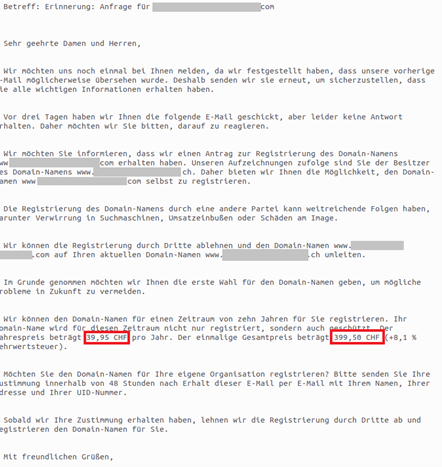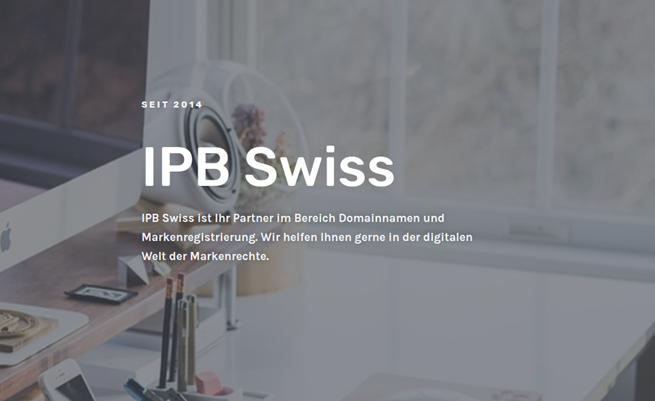28.05.2024 - A fake domain name registration company sent an email to the owner of a .ch domain. The email claimed that the fake company had received an application to register the same domain name but with a different ending. Most of the time, these emails come from fake registration companies in Asia. However, in this case, the scammer behind the fake company is German-speaking, has a website and is falsely claiming to have years of experience.

Domain registration fraud has existed for many years and is primarily directed against companies and associations. This is how the scam works: a fake registration company sends you an email claiming that a competitor has shown interest in acquiring the same domain name as yours, but with a different ending. The registration company then claims that if you do not respond, the domain name will be given to the competitor and lost to you forever. The scammers use common psychological tricks in their emails: they create time pressure and threaten the company or organisation they are targeting with serious consequences if they do not comply and register the domain names. Many of these scam emails come from Asia. That is why in many cases, in addition to the well-known .com or .org endings, they claim there is interest in .cn or .com.cn endings, which are not commonly used in Switzerland.
The people who send these emails are not looking out for your interests. They are only interested in making money from a domain registration. In these cases, the prices are massively inflated and the domain names may not even be registered after payment. It is impossible to register a domain name with all the available endings: there are currently 255 country-specific top-level domains alone. In total, there exist around 1,500 top level domains.
A Swiss company with 10 years of experience, right?
Emails urging recipients to register .ch domains, for example, are not exclusively sent from Asia. It is also common to see emails claiming to be from Swiss registration companies or suggesting a link to Switzerland. In the last few years, the company IDS Schweiz in particular has appeared in various forms and has regularly bombarded Swiss companies with this type of request. Cybercrimepolice.ch has previously warned against this company.
Now scammers seem to be active again and have launched a new attempt. In this particular case, the email came from a fake company called IPB Swiss, which claims to deal with trademark protection and to have more than 10 years of experience in this field.
However, a look at the date on which the domain was registered tells a very different story. If a domain looks suspicious, it is often helpful to check the registration date. If a domain has been created recently, this is often a sign that the initial suspicion was justified. In the case at hand, the domain of the alleged Swiss company has only existed for two months: it was registered on 21 March. The date of registration therefore does not correspond to the 10 years of experience they claim.
Another typical sign of a scam is the absence of any contact information or a company registration number on the website, with a form or impersonal email address being the only way to get in touch.
Recommendations
- If you receive an email from a supposed registration company claiming to have received an application to register your .ch domain name with a different ending, simply ignore it.
- Be sceptical if you receive emails that require action on your part and that carry a threat of consequences (loss of money, criminal charges or criminal proceedings, blocking of an account or card, missed chance, misfortune) if you do not do what is required.
- Never click on attachments or links sent to you in suspicious emails – you risk infecting your device with malware. If in doubt, use a contact option on the website to ask the supposed sender what the email is about and whether it is actually from them.
Current statistics
Last week's reports by category:
Last modification 28.05.2024











